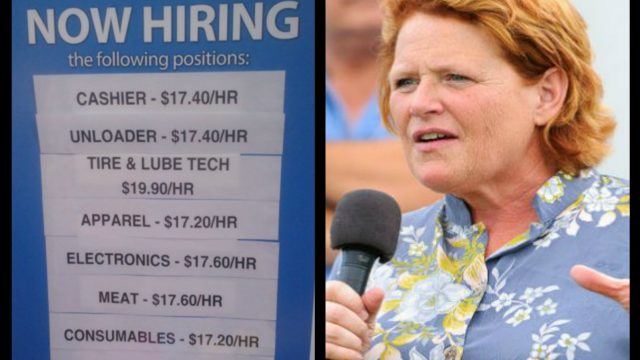Someone Tell Heidi Heitkamp: Effective Minimum Wage In Oil Patch Community Is $14 Per Hour

A couple of weeks ago a photo taken by University of Michigan Professor Mark Perry of Walmart job listings in Williston, North Dakota, went viral on the internet as the lowest offered was $17.20 per hour.
Now comes news that in another of North Dakota’s oil patch communities, the minimum wage is effectively $14 per hour. But that’s not set through policy. North Dakota has no state minimum wage, defaulting to the federal minimum wage of $7.25 per hour.
Rather, this wage is set by the labor market:
Unemployment is virtually non-existent, hiking the local minimum wage to double that of the state’s official minimum wage. “Effectively, our minimum wage in town is $14 an hour,” says Shawn Kessel, city administrator. He stresses, however, that workers are not always as hard to find as businesses may expect, depending on the skill sets they are seeking. “There’s a great many people coming to Dickinson every day and it’s just a matter of making sure they have skill sets that match up with the type of skill sets that employers need.”
This isn’t surprising, and I doubt it’s unusual in the state right now. North Dakota has lead the nation in personal income growth in 6 out of the last 7 years.
Workers here can command higher wages, because the state has a booming economy and lots of open positions. Supply and demand.
What it is, though, is a refutation of the arguments posited by supporters of minimum wage policy including North Dakota Senator Heidi Heitkamp. They argue that the only way to help low-income workers get ahead is to mandate higher wages for them. But that’s simply not true. In North Dakota, the labor market has created an effective minimum wage that is almost double the current federal minimum wage, and is significantly higher than even the $10.10 per hour minimum wage Senator Heitkamp and President Barack Obama support.
That happened because North Dakota’s economy created job, raising demand for workers and thus the wages they can command.
We don’t need the government to mandate higher wages. We need the private sector to create opportunities. Not every state in the union can enjoy an oil boom like North Dakota’s, but the principle is the same.
More jobs mean better pay.




